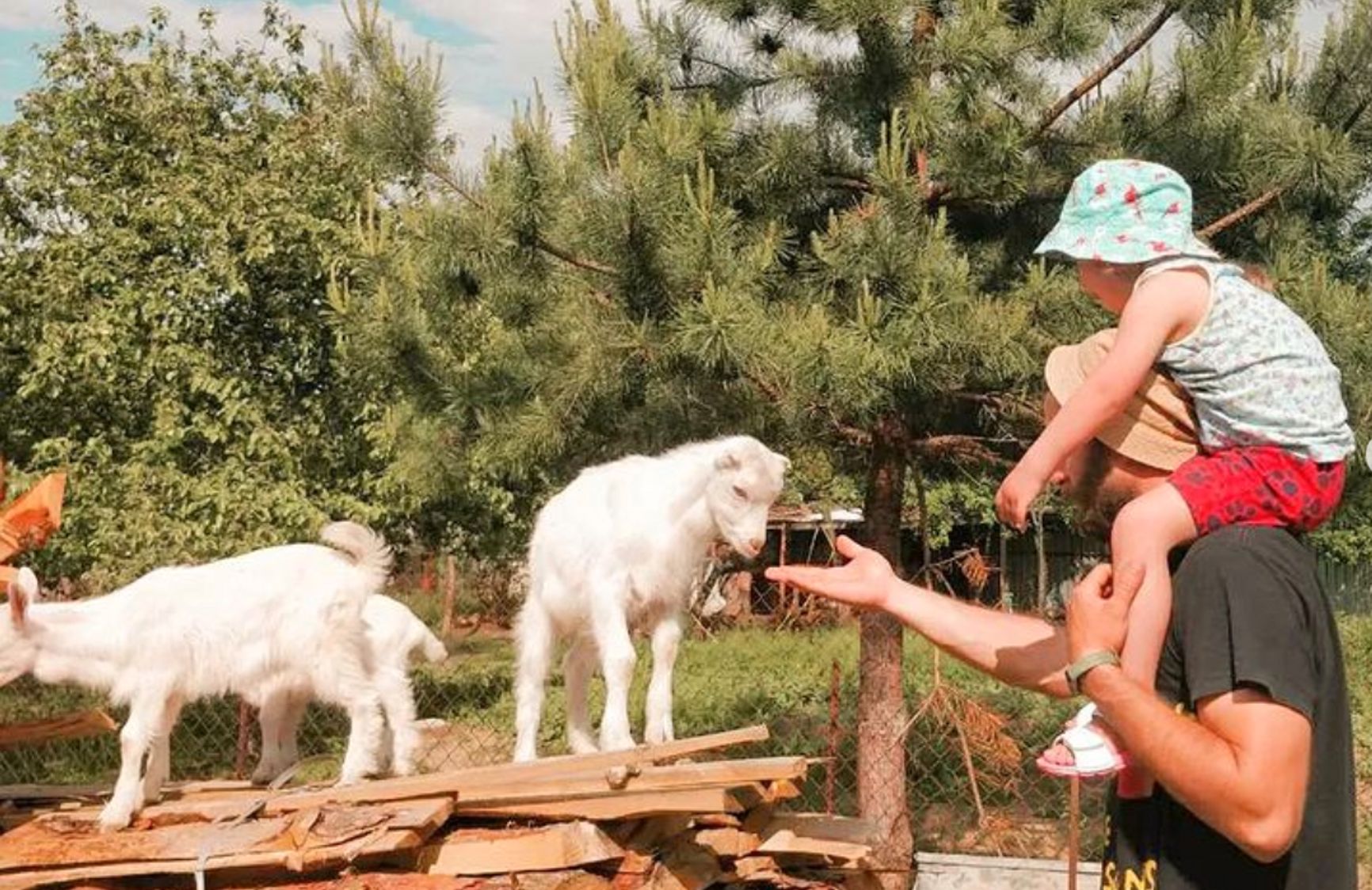
Iryna Dmytrieva, the mother of four-year-old Liza who was killed in a Russian missile strike on Vinnytsia, was hospitalized in critical condition. Soon after the attack, photos of an overturned stroller with a child’s body inside began to spread across social media. A mere few hours earlier, Liza’s mother had posted a video of her walking down the street with her daughter. Iryna ran an Instagram account about raising Liza, who was developmentally challenged. In the first days of the war, her parents took her away from Kyiv to save her from Russian bombs, but it wasn't enough.
Separated from her daughter because of the war
On February 23, Iryna's ex-husband Artem picked their daughter from preschool to bring her to Iryna on the following day. At five in the morning, explosions shook Kyiv, followed by air-raid sirens. Iryna packed Liza’s belongings and papers and waited for Artem to bring their daughter to “hug and kiss her”. They'd agreed that Artem would take the girl to a safe location. Due to heavy traffic, the father and daughter never made it to Iryna and had to leave Kyiv without seeing her.
“I didn’t even get the chance to kiss her goodbye and don’t know when we’ll see each other again. I’m heartbroken, like any mother would be. I have her favorite toy. Liza always takes her teddy bear with her to preschool but decided to leave him home yesterday. I was surprised. It's my lucky charm now,” Iryna wrote.
She added she had family and friends in Russia and wished peace and support for everyone.
On February 27, Iryna posted her drawing of a Ukrainian soldier, setting the city of Vinnytsia in central Ukraine as her location.
On the following day, she shared a photo with her daughter, remarking that her life had been divided to “before the war” and “during the war”. She also expressed hope that a “peaceful after” would come soon. She confessed that reuniting with her daughter was her biggest dream and that she lived in constant fear.

On March 2, a week into the war, she published photos and videos of Russian strikes: “Russians can’t access independent media. All they see is lies. Belarus has sent troops to Ukraine too. Why???” Iryna called on her Russian followers to visit Ukrainian bloggers’ accounts to learn the truth.
On the tenth day of the war – March 6 – Iryna wrote it was her daughter’s birthday. She turned four. “It’s been ten days since I last saw you, hugged you, kissed you. All these events are dreadful. It’s painful to see Ukraine like this. It’s painful to learn about new deaths. It’s twice as painful to be away from you. I can’t wait to see you,” Liza’s mother shared.

Iryna shared six more posts about her daughter in March, saying she called her every day. On March 31, she posted several photos of Liza, writing:
“Thirty-six days apart. We have never been separated for so long before. Some ask me: “Does Liza remember her mom?” “How is she holding up?” Deep in my heart, these questions plague me too. She tells me over the phone: ‘Mommy, I luvv you.’ And it’s enough. She hasn't forgotten me. She remembers me. She remembers everything. It won’t be long before I get her back. I don't know when the war will end, but I won't sit around waiting. My girl will be home soon.”
The long-awaited reunion
On April 7, Iryna finally met her daughter after 42 days apart. “Lizzie is with me. I’m in tears of joy! I can't believe my happiness. My little girl, my love, my life! We're finally together,” she shared with her followers. She published a video with a Ukrainian song in the background and a caption in Ukrainian.
“The first twenty minutes of our meeting, Liza kept saying: ‘Mommy, mommy, mommy...’ She stroked my face and hugged me,” wrote Iryna in another post on April 7.
“I used to wonder how people could have reunions, keep working, dance, start families, drink coffee, and laugh during the war... But now I understand that life goes on. When the initial shock wears off, you get used to the new surroundings, get a grip on yourself, and start your life anew in the new conditions.”
In May, Iryna shared that her daughter had been diagnosed with rheumatoid arthritis: she’d started experiencing the symptoms back in December 2021, after which she’d undergone tests and therapy in Kyiv. However, the symptoms persisted: the girl began to limp, “stretch out her leg and complain of pain”. In Vinnytsia, she had to complete a full check-up again, take all the tests, and get another round of therapy. Iryna remarked it was a lengthy process that would take at least a year. “We have tests scheduled a month from now, followed by health check-ups every three months.”
Later on, Iryna posted photos of her spring walks with Liza, writing she missed her home, which she'd left almost three months earlier, and that her “life and soul remained in Kyiv”.
“It was still winter when I left, and now we only have a few weeks left till summer. All the plans we had... And now we have to start anew. I’ve moved four times over the last two years, giving my life a one-eighty every time.”
Iryna also marveled at the fact that her daughter would start school three years later and shared she’d began taking speech therapy again. Late in May, Liza spent a week in Kyiv with her dad, while Iryna took time to prepare for her driving exam.

In June, she posted a few more photos, including a photo of herself with Liza taken in Kyiv on the 22nd. “My little flower.” “What bliss!” “Aren't they sweet? Love her to pieces,” she wrote below photos of her daughter. However, her photos of Liza in July came to be her last.
“Finally, a photo together!”
Iryna was thrilled to make a photo shoot with her daughter and kept sharing photos and videos a few days running.
“Finally, a photo together. Liza is such a strong-willed girl! She says she wants a photo, and then changes her mind all of a sudden. It was so easy when she was young. Now I have to make sure I use the right words, appease her, get her permission, and build our dialog.”
She wrote she’d always wanted to visit this lavender field and that they’d finally made it this year.
“It feels so good to be my daughter’s main role model. She mimics absolutely everything: dancing moves, gestures, posing in front of a mirror, small mundane things. If I do sports, so does she. If I wear make-up, she wants some too. It’s so true that you child's upbringing starts with yourself.”
In her last post with Liza’s photo from the lavender field, Iryna mentions the “developmental crisis at three years” and the challenges of her motherhood.
“She won't listen. She does the opposite, on purpose. She throws a tantrum every time I dress her. Keeps saying no to anything I say. Where has my angel gone? She used to be an obedient kid. The only thing that keeps me going is the knowledge that it’s just a phase. She’ll grow out of it. But we’ve already scheduled a session with a psychologist. Issues must be dealt with right away, until it's too late.”
Once Liza had been reported dead, Olena Zelenska wrote on Twitter she had known the girl, posting a Christmas video in which they appear together.
On July 14, Ukraine reported that the center of Vinnytsia had been hit with Russian cruise missiles Kalibr, launched from a submarine in the Black Sea. According to the most recent data, the death toll of the Vinnytsia missile strike has reached 23, including three children, one of whom is Liza. The two other child casualties were six and seven years old; no other details are known. Over a hundred city residents were injured and sought help at local hospitals. The Russian Ministry of Defense justified the attack on Vinnytsia by the need to destroy the alleged “Nazi stronghold” at the Officers’ House. Margarita Simonyan, the chief of propagandist channel RT, published the ministry's response on Telegram.
Since the first day of the war, Russia insists it only attacks Ukraine’s military infrastructure. In fact, civilian facilities are hit on a regular basis. Thus, July 3 was marked by a Russian attack on Sloviansk. Mayor Vadym Liakh reported the strike was “the largest over the recent weeks.” Another frequent target is the city of Mykolaiv. According to Mayor Oleksandr Senkevych, the overall damage Mykolaiv sustained from Russian attacks has reached 633 million hryvnias (~$21.4 million).